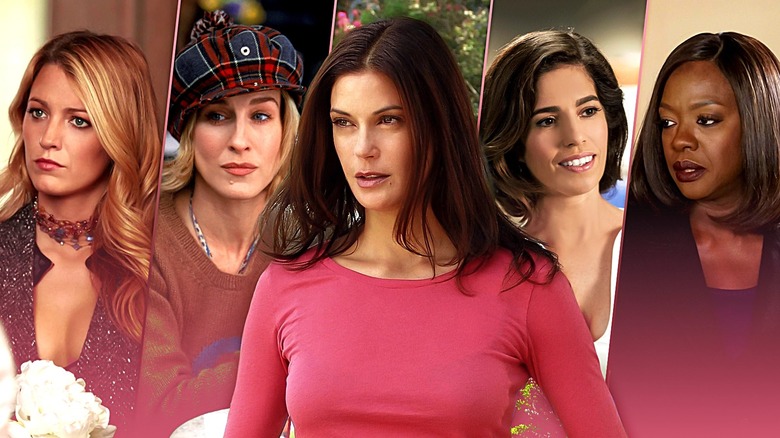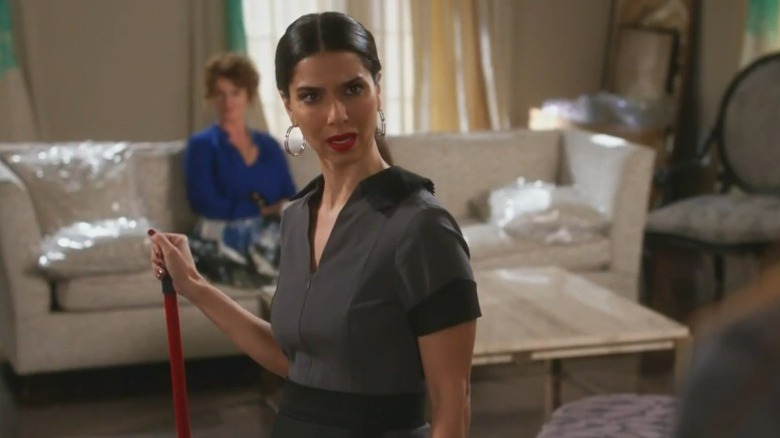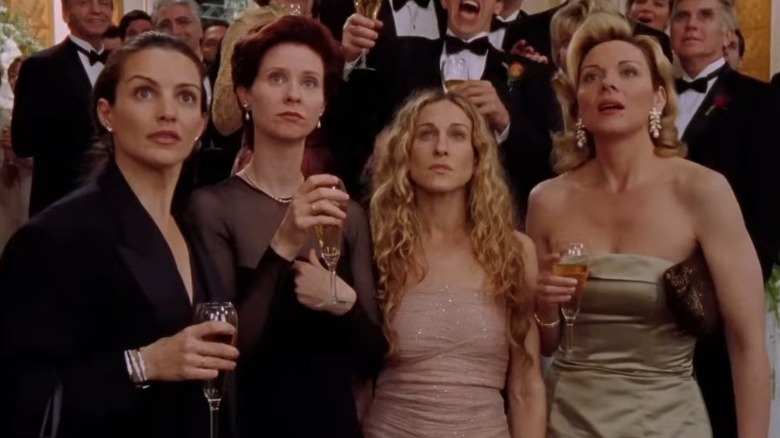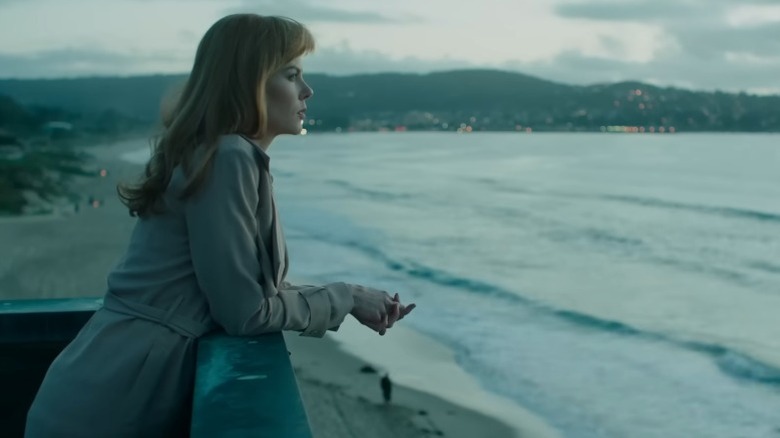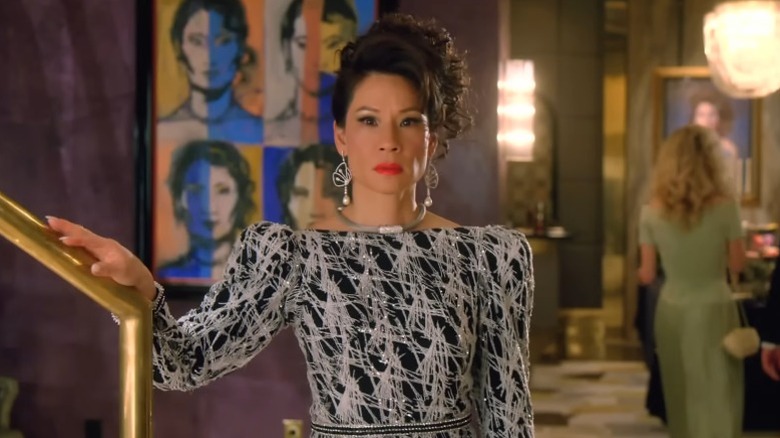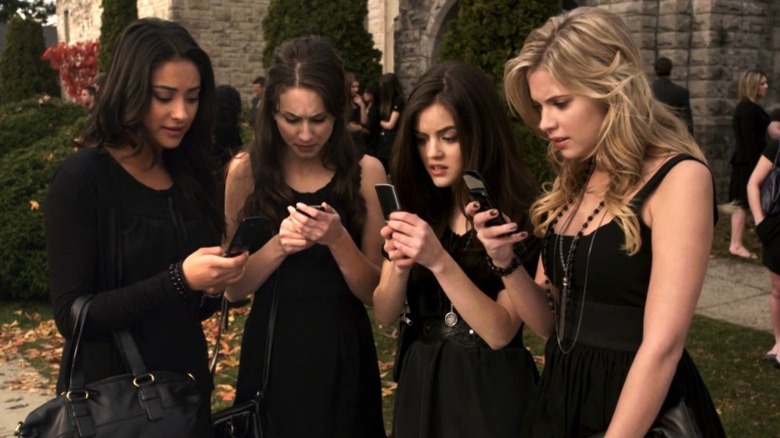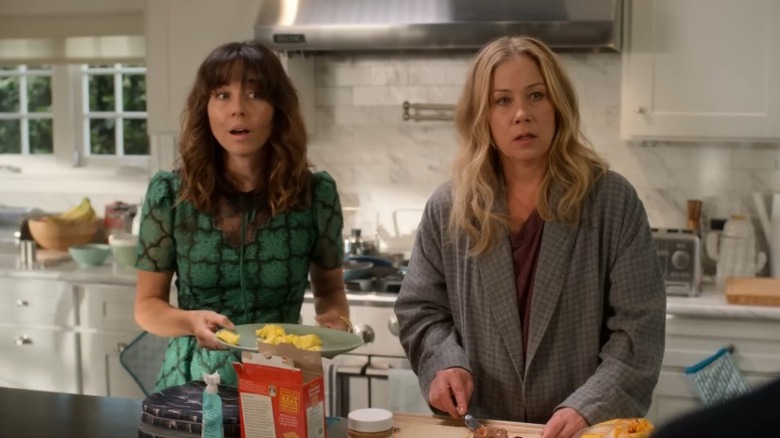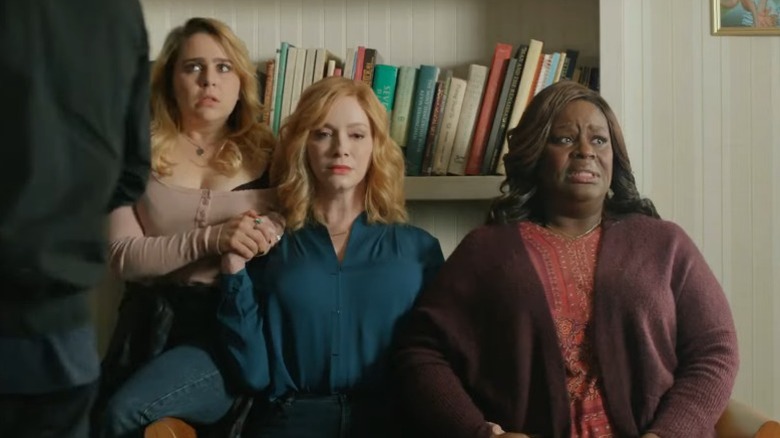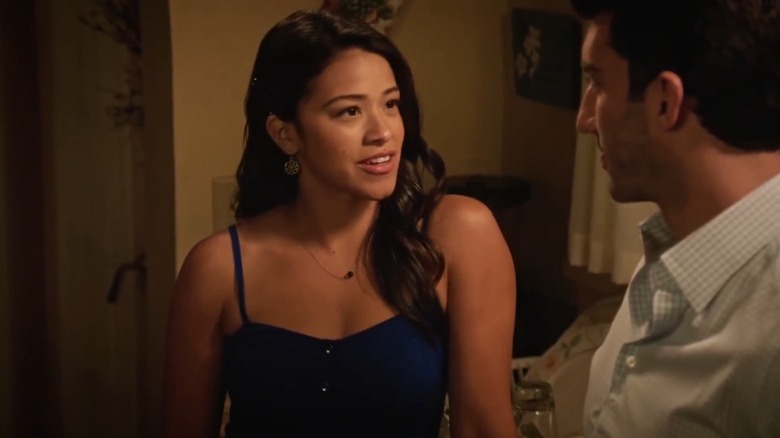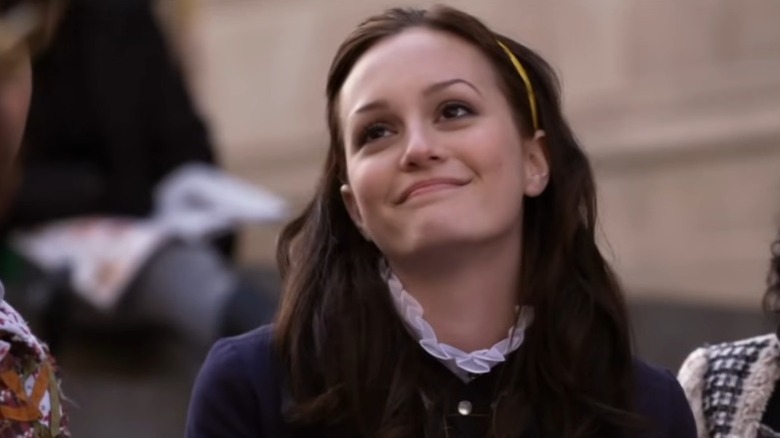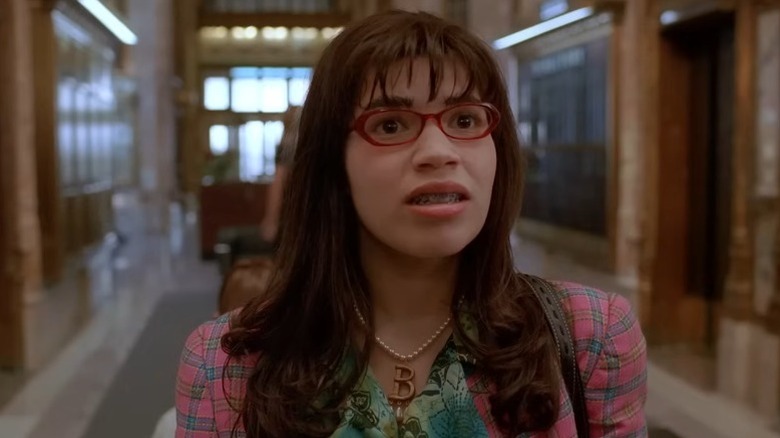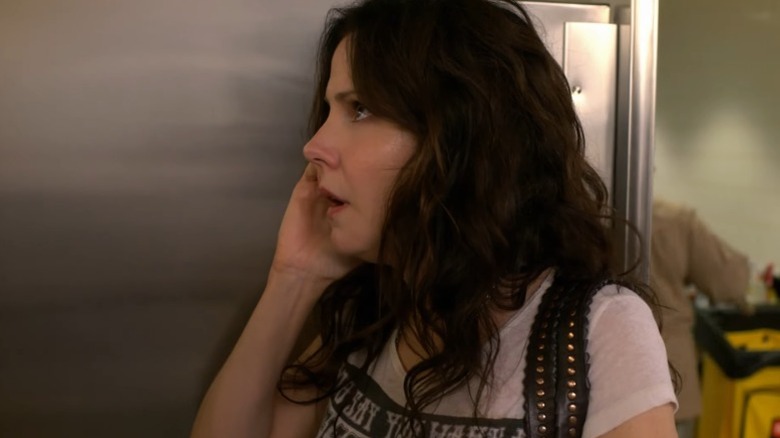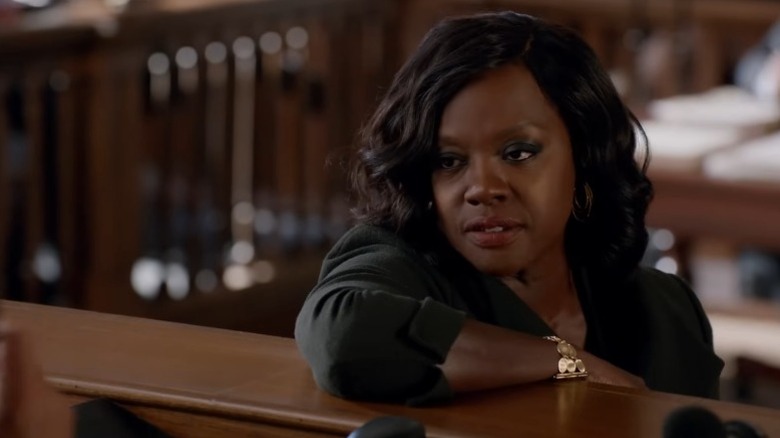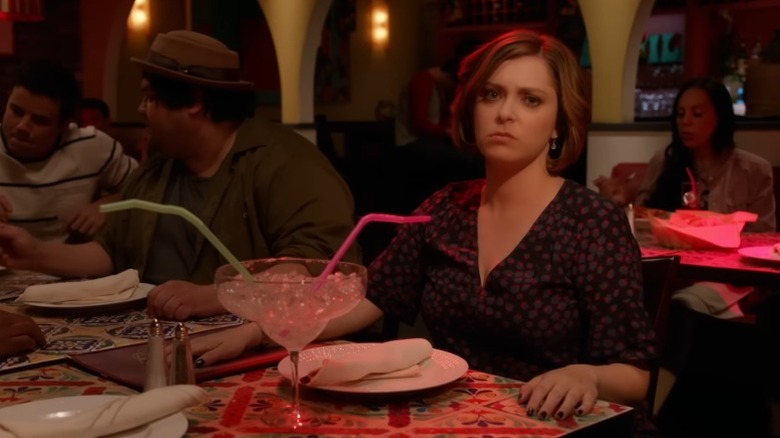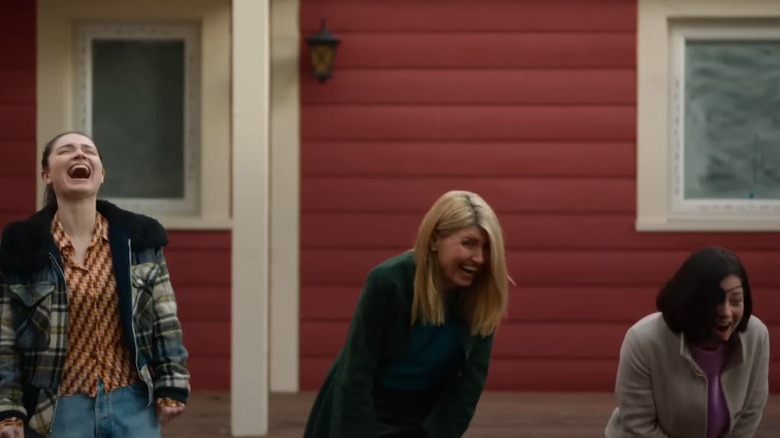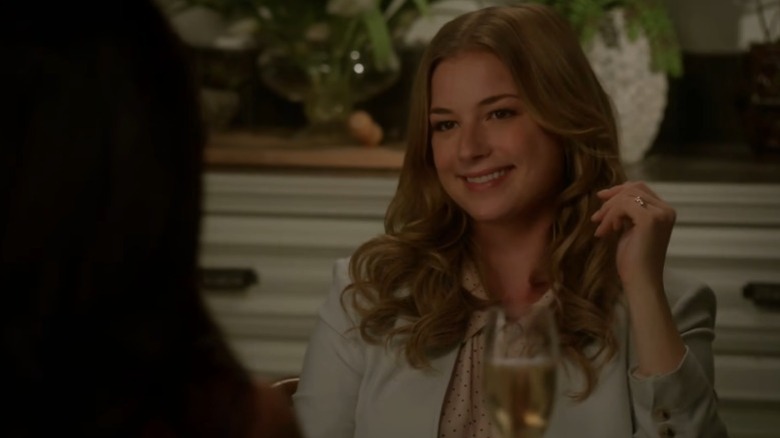15 Best TV Shows Like Desperate Housewives
Created by Marc Cherry and starring one of the all-time great TV leading quartets in Teri Hatcher, Felicity Huffman, Marcia Cross, and Eva Longoria, "Desperate Housewives" was a lightning-in-a-bottle moment for primetime network television. An unabashed, proudly over-the-top soap opera charting every crisis that could befall a group of suburban characters juggling dark secrets and deep passions, it was also, for all intents and purposes, a comedy series — and the improbable delicacy of that particular conceptual Venn diagram made the eight-season ABC hit one of the defining shows of the 2000s.
If you're a fan of "Desperate Housewives" looking for other series that share its blend of zany humor, emotional intensity, and sheer campy absurdity, the good news is that there are plenty of other great TV shows out there you can give a watch. Here are 15 of the most essential.
Devious Maids
Developed by Marc Cherry as an American adaptation of the Eugenio Derbez-created Mexican series "Ellas son... la alegría del hogar," "Devious Maids" is in many ways a direct spiritual successor to "Desperate Housewives," starting with the fact that it also follows a small group of women as they become entangled in thorny suburban intrigue. Crucially, however, "Devious Maids" presents the downstairs counterpart, so to speak, to "Desperate Housewives'" upstairs: Ana Ortiz, Dania Ramirez, Roselyn Sanchez, Judy Reyes, and Edy Ganem star as five maids who work for the Beverly Hills elite and are privy to its many dark secrets.
It's just about perfect viewing for anybody who took to the particular flavor of high camp of "Desperate Housewives," buoyed by an equally charismatic cast with an equally sharp understanding of the assignment. At just four seasons and 49 episodes, it's often an even more taut and unrelenting watch, where the fever-pitch intensity of the drama never lets up.
Sex and the City
An unparalleled TV phenomenon, HBO's "Sex and the City" follows four thirtysomething friends as they embark on various adventures in dating, sex, commitment, and self-discovery and explore the myriad possibilities of New York City life. Led by the meditative Carrie Bradshaw (Sarah Jessica Parker, who was terrified when HBO picked up the show) and her musings on love via a popular newspaper column, the cast — also including dyed-in-the-wool romantic idealist Charlotte York (Kristin Davis), open-minded adventurer Samantha Jones (Kim Cattrall), and self-reliant cynic Miranda Hobbes (Cynthia Nixon) — would be among the most iconic sitcom ensembles of all time, were it not for the fact that "Sex and the City" is too emotionally and tonally varied to qualify as a sitcom.
In that way, it's a show that shares a lot of tonal commonalities with "Desperate Housewives" — both series have a way of finding the humor in personal calamities without downplaying their sometimes apocalyptic gravity — even before you get to the fact that "Sex and the City" epitomizes the "close female friends navigating adult life" conceit, and therefore qualifies as a bit of an industry precursor.
Big Little Lies
For those looking for a variation of the "Desperate Housewives" suburban maelstrom with a more serious and dramatic undercurrent, there's no going wrong with "Big Little Lies." Originally a miniseries before being brought back due to enormous critical and commercial success, HBO's acclaimed prestige concoction delves into the secrets and tensions simmering beneath the idyllic surface of the coastal town of Monterey, California.
Reese Witherspoon, Nicole Kidman (giving a career-highlight performance in one of her best projects ever), Shailene Woodley, Zoë Kravitz, and Laura Dern star as five mothers with an initially undisclosed degree of involvement in a possible homicide at an elementary school fundraiser. The original season then flashes back to the beginning of the school year to show how their intertwined lives eventually led to the death in question, and to the ensuing criminal investigation.
It's a show that manages the wondrous feat of striking a perfect balance between juicy, oft-campy drama and genuine psychological and emotional insight, with a cast of characters that reveals fascinating new layers to us with each episode. Watching both seasons of "Big Little Lies," you will find yourself basking in the warmth and texture of the lived-in storytelling as often as you'll be holding your breath in anxious anticipation of what will happen next.
Why Women Kill
Another show created by Marc Cherry that should definitely be on your radar is "Why Women Kill." A dark comedy series presented in an anthology format, with each of its two seasons telling distinct stories linked by the common subject of women facing marriage troubles, "Why Women Kill" has a similar tone to "Desperate Housewives" yet is distinguished both by its hopping between time periods and by its unique structure.
The first season follows the stories of three women (Ginnifer Goodwin, Lucy Liu, and Kirby Howell-Baptiste) who each resided in the same Pasadena mansion at a different point in history between the 1960s and the 2010s, while season 2 goes all the way back to 1949 for a single story about the complicated, murder-strewn relationship between two housewives (Allison Tolman and Lana Parrilla).
In both seasons, we get a full display of Cherry's knack for constructing the kind of tensely unspooling drama that pulls you right in and never lets go, and the variety of time periods allows for a wide-ranging assortment of flavors of suburban crisis.
Pretty Little Liars
The original "Pretty Little Liars" novel series by Sara Shepard came from a TV show concept explicitly conceived as a teen-oriented take on "Desperate Housewives," so it's no surprise that the books' Freeform (formerly ABC Family) TV series adaptation scratches a similar itch to the hit ABC series. Set in the fictional town of Rosewood, Pennsylvania, "Pretty Little Liars" follows four high school best friends who grow apart after the mysterious disappearance of their clique leader (Sasha Pieterse), only to be reunited when a mysterious entity known as "A" begins to send them threatening messages revealing knowledge of their darkest secrets.
Like "Desperate Housewives," it's a show that traffics in the brittle, unnerving space between public presentation and private reality, getting untold amounts of mileage out of the protagonists' need to stay on top of their reputation in the face of encroaching threats. Also like "Desperate Housewives," it knows just when to avoid taking itself too seriously — as well, conversely, as when to push the seriousness all the way into lurid overdrive. Shame about that canceled spin-off, though.
Dead to Me
For a show that deals in the same kind of increasing calamity of any given "Desperate Housewives" storyline, but limits its focus to just two characters and the constantly shifting dynamics of their relationship, you can look to Netflix's great, underrated "Dead to Me."
Created by Liz Feldman, this addictive dark dramedy follows Jen (Christina Applegate), a woman who recently lost her husband to a hit-and-run incident, and Judy (Linda Cardellini), who claims to have lost her fiancé to a heart attack. The two women meet at a grief support group and form a deep connection; unbeknownst to Jen, however, Judy was the driver who killed her husband, and has since been harboring a profound, soul-consuming guilt.
The less said about the ensuing quandaries faced by Jen and Judy, and about the volatile and complex nature of their bond, the better. Just know you're in for a heck of a ride, with each episode and each season pushing the madness further while Applegate and Cardellini (and James Marsden, on one of his best TV shows) anchor it all with commanding, fearless, achingly human work.
Good Girls
Created by Jenna Bans, NBC's "Good Girls" spins four seasons of twisty, live-wire entertainment out of the story of Beth Boland (Christina Hendricks), Ruby Hill (Retta), and Annie Marks (Mae Whitman), three struggling mothers in suburban Michigan who band together to carry out a last-ditch plan to get on a better financial standing: an elaborate heist on a supermarket. Following the heist's success, they embark on a life of escalating criminal activity and find themselves entangled with a local gang led by Rio (Manny Montana).
A gobsmacking treatise on what people will do for family, "Good Girls" is as fascinated as "Desperate Housewives" with the social intricacies of suburbia, and with the room for dangerous mischief therein. But, even more importantly, "Good Girls" should be of interest to any "Desperate Housewives" fan because it is similarly interested in the inner lives and nerve-racking external conflicts mobilized by a cast of enormously charismatic women. Hendricks, Retta, and Whitman, all underrated actresses with a storied history of scene-stealing TV supporting roles, each get the opportunity to flex their acting muscles to a greater degree than ever before, and accordingly turn in career-best performances across the show's 50 episodes.
Jane the Virgin
One of the best TV shows that never won an Emmy, "Jane the Virgin" played a large part in keeping the flame of the primetime soap opera alive throughout the increasingly prestige-inclined and streaming-dominated 2010s. Created by Jennie Snyder Urman as a loose adaptation of the Venezuelan series "Juana la virgen," "Jane the Virgin" positions itself simultaneously as a parody, homage, and straight rendition of a classic-style Latin American telenovela, telling the story of Jane Gloriana Villanueva (Gina Rodriguez), a 23-year-old Venezuelan-American virgin who accidentally becomes pregnant by artificial insemination following a mix-up during a routine checkup.
If that sounds like a wild setup, that's because it is, and "Jane the Virgin" is as aware of that fact as "Desperate Housewives" is aware of the inherent absurdity of much of its plotting. Both are shows that sneak up on you with laughs and satirical affect before hitting you with the full, gut-wrenching force of their narratives — and the cast of "Jane the Virgin" is similarly full of stars, with Gina Rodriguez's leading performance standing easily among the best and most entertaining of American television this century so far.
Gossip Girl
It's impossible to talk about the modern history of primetime soap without talking about "Gossip Girl." The CW's seismically popular adaptation of the eponymous novel series by Cicely von Ziegezar captured the imagination of an entire generation and launched multiple film and TV superstars; if you were of a specific age in the 2000s and early 2010s, there was no getting around the story of Serena van der Woodsen (Blake Lively), Blair Waldorf (Leighton Meester), and their secretive and ambitious cohorts in the moneyed class of Manhattan's Upper East Side.
While it tells of an even more rarefied and hermetic world than the suburban dreamscape of "Desperate Housewives," "Gossip Girl" is absolutely worth a watch for anyone who gets a kick out of the high-wire drama of the rich and well-to-do. It's not quite as constantly and overtly comedic as "Housewives," but it is similarly happy to twist the absurdities of its milieu into biting and deliriously entertaining caricature; there are stretches late into its run where the sheer go-for-broke insanity of the plotting gives any "Housewives" season a run for its money.
Ugly Betty
The turn-of-the-century Colombian telenovela "Yo soy Betty, la fea" is among the most adapted and remade television series of all time, with local versions in over 20 countries — and the English-language American version, "Ugly Betty," is a show that belongs to the same tradition of frothy 2000s primetime dramedy of "Desperate Housewives." Developed by Silvio Horta, "Ugly Betty" follows Betty Suarez (America Ferrera), a fashion-oblivious Mexican American New Yorker who begins to work at the glamorous fashion magazine "MODE" as an assistant to its arrogant editor-in-chief, Daniel Meade (Eric Mabius).
A peppy ensemble comedy with a murderer's row of endearing characters who get smartly and richly developed over the course of four seasons, "Ugly Betty" is generally not quite to the same level of darkness and gruesomeness as "Desperate Housewives." But it more than makes up for that in sheer soapy gusto, mapping out the story of Betty's emotional and romantic maturity as a kind of heartrending years-long romcom, while consistently ensuring that her characterization — or that of any other character — isn't limited to just romantic exploits. And Ferrera, in her breakthrough role more than a decade before her big "Barbie" monologue, is utterly stunning in the role of Betty, never losing her grip on the character no matter how labyrinthine the plot gets. She didn't win an Outstanding Comedy Actress Emmy for nothing.
Weeds
"Weeds" is frequently left by the wayside in discussions of the rise of prestige television, even though it pioneered crime-centric antihero dramedy in the 2000s (in fact, "Breaking Bad" almost didn't happen because of it) and marked the artistic growth of creator Jenji Kohan before her authoring of "Orange Is the New Black." Nevertheless, the eight-season Showtime series — which tells the story of widowed suburban mother Nancy Botwin (Mary-Louise Parker), who begins selling marijuana to keep her family financially afloat — is a bold, gripping, mordantly hilarious TV trailblazer that pursues many themes common to "Desperate Housewives" into murkier and darker waters.
If "murkier and darker" sounds like a tall order for a series being compared to "Desperate Housewives," rest assured, "Weeds" delivers. Kohan and her fellow writers take advantage of that Showtime creative freedom to keep pushing things further and further each season, letting each character in the ensemble exist in full, messy, unvarnished glory as components in a no-holds-barred satire of suburbia's criminal underbelly. Episodes are structured to make for perfect binge-watching, with each one leading squarely into the next. And, on top of all that, it's just a really funny show.
How to Get Away with Murder
Created by Peter Nowalk and executive produced by Shonda Rhimes as one of the flagship shows of her Shondaland production house, "How to Get Away with Murder" revitalized the American legal drama by interfacing it with sizzling, juicy, prime-cut soap thrills. Viola Davis, in one of the most iconic performances of 21st-century television, stars as imperious law professor Annalise Keating, who becomes embroiled in an intricate murder plot with several students in her highly competitive Middleton University class.
The show's direct proximity to topics of murder, conspiracy, and criminal investigation allows "How to Get Away with Murder" to go even harder than previous Shondaland hits like "Grey's Anatomy" and "Scandal" in its pulpy, action-packed, twist-filled storytelling. It's not an outwardly humorous or satirical show like "Desperate Housewives," but it's in the same ballpark of irresistible viewing — and it's the kind of show that has so much fun with itself as to feel endlessly playful even when it's tackling dense subject matter.
Crazy Ex-Girlfriend
On its face, "Crazy Ex-Girlfriend" might not look like an intuitive recommendation for a fan of "Desperate Housewives." It is, after all, a zany comedy where internal conflicts are expressed through lavish musical numbers featuring wonderfully catchy original songs — a far cry, it might seem, from the soapy dramatics of the ABC show. But aside from those differences in formal presentation, "Crazy Ex-Girlfriend" actually strikes a similar tone to "Desperate Housewives" and offers surprisingly kindred pleasures.
For starters, "Crazy Ex-Girlfriend" is a show that doesn't hold back — either in its loopy narrative choices, or in the scorching exploration of internal conflicts and themes like mental illness and generational trauma. Secondly, it approaches everything with a deceptively light touch; much like "Housewives," any given episode has a high likelihood of pulling you in with giddy amusement and sharp social observation before absolutely devastating you with its unexpected swerves. Most importantly, however, "Crazy Ex-Girlfriend" takes place in a universe where even would-be markers of lightness — the comedy, the colorful musical numbers, the cartoony sensibilities — are infused with a sense of, well, desperation.
Bad Sisters
A superb murder mystery about sisterly love, the Irish Apple TV+ series "Bad Sisters" is a bit underdiscussed in the United States, even if it received enough critical and industry attention to nab multiple Outstanding Lead Actress in a Drama Series Emmy nominations for Sharon Horgan. The story of five Dublin sisters who may or may not have killed the abusive husband of the second eldest, Grace Harvey (Anne-Marie Duff), should be a massive worldwide hit, teeming as it is with searing emotion, compulsive watchability, and mesmerizing character work.
It should, in particular, be of self-evident interest to any fan of "Desperate Housewives" looking for another show that allows its female protagonists to be complicated and twisted without losing sight of their humanity. The plot of "Bad Sisters" eventually takes on farcical, quasi-surreal undertones in a way that suggests a deliberate effort on the part of Horgan (its co-creator as well as co-star) et al. to pay tribute to kitschy family sagas like "Housewives," yet the show hardly ever loses track of who its antiheroines are and where their truths as characters lie. It's appointment viewing for anybody who likes their soap a little saltier.
Revenge
One of the biggest audience hits of the 2010s, ABC's "Revenge" stars Emily VanCamp as Emily Thorne, a mysterious young woman who arrives in the Hamptons as a newcomer to their idyllic beachside community. Over time, it becomes clear that Emily has a hidden agenda: An intricate, elaborate plan to get revenge on the people who wronged her family and ruined her life two decades earlier. In the process of exacting her vengeance, Emily clashes with Victoria Grayson (Madeleine Stowe), the matriarch of the powerful Grayson clan.
Four seasons of relentless, rapid-fire intrigue ensue, with nary an episode that isn't expertly designed to get your heart pounding and your hands scrambling for the remote to put on the next installment. For fans of "Desperate Housewives," it's a fascinating snapshot of when American television was in the process of optimizing its own hypnotic force, with the relatively patient, nearly decade-long sprawl of "Housewives" giving way to an even more ruthlessly efficient take on the same basic storytelling idea: Turning up the drama as high as it could be turned. Watch as little as one episode, and there's a good chance you'll be hooked.
